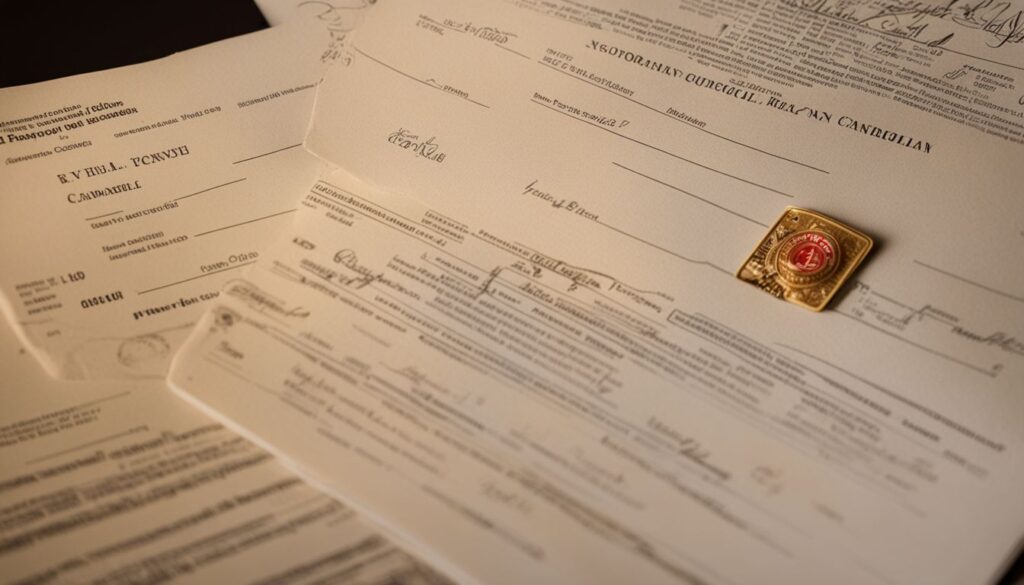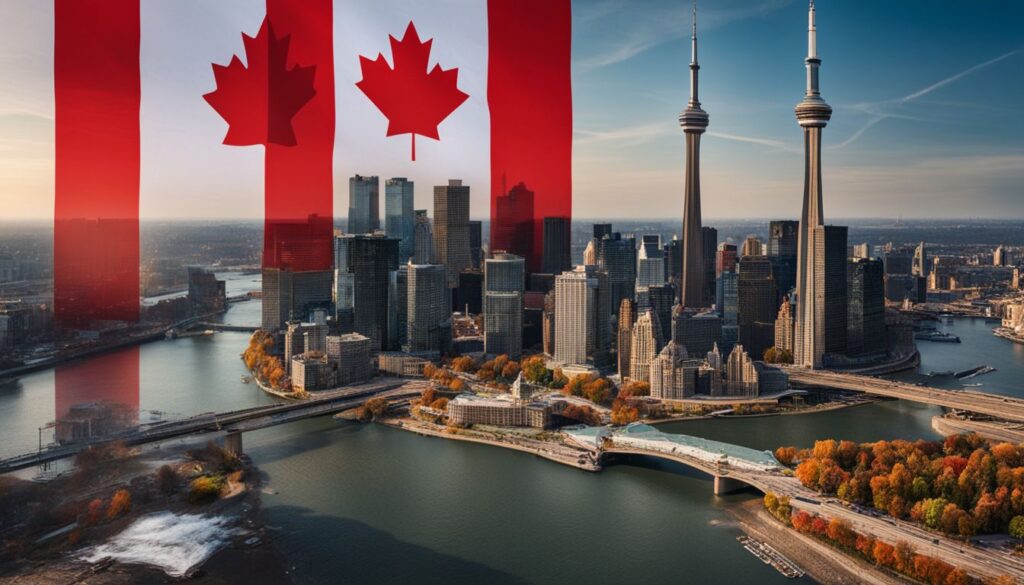Table of Contents
Toggle
Our guide will take you through each step you need to simplify this document authentication process. Read on and make it easier on yourself.
Struggling to figure out how to get an apostille for your Canadian birth certificate? We understand—navigating bureaucratic processes can be a real headache. With the Apostille Convention now in effect in Canada as of January 11, 2024, we’ve done the legwork so you don’t have to.
Key Takeaways
-
- The Apostille Convention, effective in Canada from January 11, 2024, simplifies the legalization of Canadian birth certificates for international use by replacing prior authentication methods with a standardized apostille certificate.
-
- To get an apostille for a Canadian birth certificate, you need several documents including the original birth certificate, certified translations if needed, notarized affidavits and attestations, and proof of payment for government fees.
-
- Authentication confirms the official’s signature on your document. Legalization involves extra steps for non-apostille countries needing embassy or consulate certifications after authentication.
-
- Global Affairs Canada offers free apostilling services while state offices handle verification processes. Notary services can cost around $50 with translation costs varying between $0.20 to $0.30 per word.
-
- Due to recent changes starting in January 2024, processing times have increased significantly without expedited options; planning ahead is crucial to avoid delays affecting travel and other plans requiring authenticated documents.
Understanding the Apostille Convention in Canada

The Apostille Convention helps simplify the legalization of documents for international use. In Canada, this affects how birth certificates are processed for global recognition.
Effective date and implications
The Apostille Convention took effect in Canada on January 11, 2024. This change means that Canadian public documents like birth certificates will be easier to authenticate. They will include a standard certificate called an apostille.
Documents with an apostille are accepted in over 120 countries. This helps Canadians have their official papers recognized overseas. Processing times may be longer due to the new changes, and no expedited services are available yet.
Eligibility and Document Requirements

You need to meet certain criteria and have specific documents for the Apostille process. Read more to find out what’s needed.
Required documents for the Apostille process
To apostille a Canadian birth certificate, gather the needed documents. Follow this list to ensure you have everything ready:
-
- Original Birth Certificate
This must be issued by the provincial or territorial vital statistics office in Canada.
- Original Birth Certificate
-
- Certified Translation
Provide a certified translation if the document is not in English or French.
- Certified Translation
-
- Affidavit for Authentication
This affidavit must be signed and sealed by a Canadian notary.
- Affidavit for Authentication
-
- Attestation of Translation
Attestation by a Canadian notary public who speaks both English or French and the language of the document.
- Attestation of Translation
-
- Cover Letter
It should include your contact information and request details. Specify that you are seeking an Apostille for a birth certificate.
- Cover Letter
-
- Photocopies of Your Documents
Notarized copies may be necessary before submitting them for authentication by a competent authority.
- Photocopies of Your Documents
-
- Government Fees Payment Receipt
Include proof of payment for processing fees charged by Global Affairs Canada or Provincial Competent Authorities.
- Government Fees Payment Receipt
-
- Envelope with Return Address
Prepaid and self-addressed envelope for sending back your authenticated documents.
- Envelope with Return Address
These items will help complete the Apostille process efficiently and effectively.
Eligibility criteria for Canadian birth certificates
To get an apostille for a Canadian birth certificate, the document must be issued in Canada. It should either be in English or French. If it’s in another language, it needs a certified translation and notarization by an Ontario notary public.
Birth certificates from any province or territory are eligible if they meet these conditions.
Canadian authorities only issue printed apostilles. Diplomas, degrees, and transcripts from Ontario public colleges after January 2019 can also be authenticated directly without more notarization steps.
Step-by-Step Guide to Apostille a Canadian Birth Certificate
**Step-by-Step Guide to Apostille a Canadian Birth Certificate:**
Follow our easy steps to get your birth certificate apostilled.
Step 1: Verify your requirements
First, check if your Canadian birth certificate needs an apostille for recognition abroad. Not all countries require this step. The Apostille process applies only to countries that are part of the Apostille Convention.
You might need it if you plan on working overseas, studying abroad, getting married in a foreign country, or applying for dual citizenship.
Identify the specific documents required for the apostille process. You must have an official Canadian birth certificate before starting. Make sure your document meets all eligibility criteria set by Global Affairs Canada or other provincial authorities.
This will save time and help avoid delays later on in the process.
Step 2: Prepare your documents
Gather your original birth certificates. Make sure they have a real signature and seal. Check that the documents are in English or French; if not, get an official translation.
Some papers need notarization before they can be approved by the right office. Check each paper’s rules to avoid delays. For faster service, some state vital records offices offer direct delivery options.
Step 3: Submit your service request
Send your papers to Global Affairs Canada or a state authority. Some papers, like those from the Canadian government, need notarization before getting an apostille.
Letting someone else handle this can save time since getting an apostille can take a long time. This way, you get faster results and feel less stressed.
Authentication vs. Legalization
Authentication and legalization are two different processes for validating documents. We help you decide which method suits your needs.
Understanding the differences
Authentication and apostille have different purposes. Authentication confirms that a public official’s signature is real on a document. After authentication, an apostille certificate, called an “allonge,” is given by Global Affairs Canada or a provincial authority.
Legalization is another step often mixed up with authentication. Both check if documents are real, but legalization needs more steps for use in non-apostille countries. It involves extra certification by consulates or embassies.
Choosing the right process makes sure your documents are accepted abroad.
When to choose each process
Choose authentication if your paper needs approval by Global Affairs Canada. This step ensures the paper is real and valid for use in other countries. Legalization happens after authentication.
Select legalization when an embassy or consulate of a foreign country must check your paper. It follows after authentication, making sure it meets that country’s legal rules. Using professional services can save time and avoid common errors in these steps.
Choosing the Right Service
Choosing the right service depends on your needs and location. We can help you navigate different options to ensure you get the best support.
Global Affairs Canada services
Global Affairs Canada provides apostilles for documents issued by the Government of Canada and some provinces. They help confirm documents like birth certificates, making them valid in countries that are part of the Apostille Convention.
There are no fees for this service. You can contact Global Affairs Canada for questions or updates about your document requests. This makes it easier to use Canadian documents abroad without needing legalization from embassies or consulates.
Provincial competent authority services
State offices in Alberta, British Columbia, Ontario, Quebec, and Saskatchewan provide services to confirm and approve certain documents. These services check and validate papers through a government office.
Right now, it takes longer than usual because many people are requesting these services.
You need to look at each state’s rules before you send in your papers. If your document is not in English or French, you must get an official translation. There might be other ways to verify your documents that could work better for you.
Fees and Processing Times
Fees and processing times can vary. It’s important to check the current rates and timelines before starting the process.
Overview of costs
Global Affairs Canada does not charge for authenticating a document. Notary services cost about $50. Translation charges range from $0.20 to $0.30 per word, depending on the language and complexity.
Legalization fees at the embassy or consulate can vary widely, from just a few dollars to as much as $760 per document. It’s important to plan for these expenses when getting an Apostille for your Canadian birth certificate.
Expected processing timelines
Processing times have gone up because of changes starting January 11, 2024. It now takes a few weeks to get a visa apostille in Canada. Requests sent four months ago will still need five more business days for mailing.
There are no rush services right now.
We must plan ahead due to these delays. Always consider standard processing times when you submit your application to avoid any last-minute problems with your documents or travel plans.
Conclusion
Understanding the apostille process can seem tricky. We hope this guide clears things up. At Hadri Law Professional Corporation, we are here to help with all your document needs. Contact us (Email: contact@hadrilaw.com) if you need more assistance with getting an apostille for your Canadian birth certificate.
